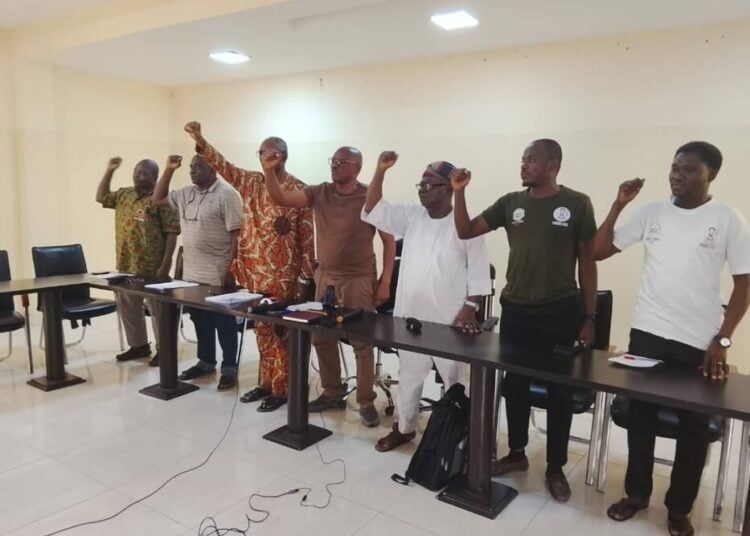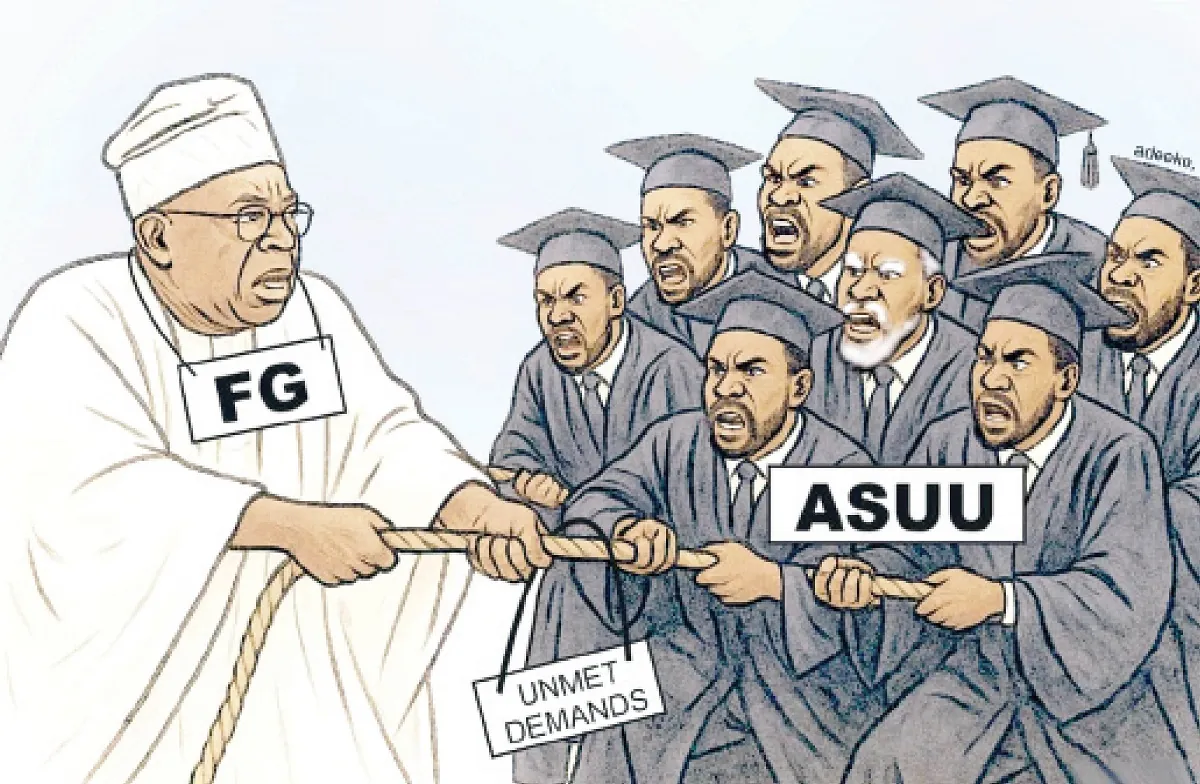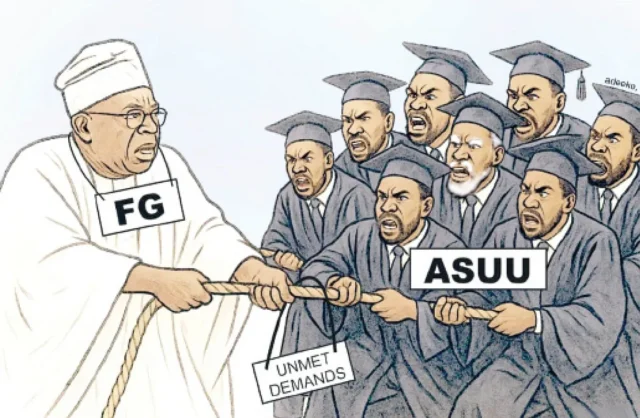In a dramatic turn, the Academic Staff Union of Universities (ASUU) has formally announced a two-week, total and comprehensive strike, beginning at 12:01 a.m. on Monday, October 13, 2025. This comes after the expiration of a 14-day ultimatum issued to the Federal Government over unresolved demands.
Addressing the press in Abuja on Sunday, ASUU President Prof. Chris Piwuna expressed deep frustration over the government’s inaction, saying that nothing “sufficient” had been offered to avert the strike. He confirmed that all branches of the union have been directed to withdraw services in compliance with the resolution of the National Executive Council (NEC).
ASUU had earlier issued a 14-day ultimatum, dated September 28, demanding the government implement previously negotiated agreements, particularly the 2009 ASUU-FGN pact, release revitalisation funds, pay outstanding allowances, and remedy promotion arrears. With no meaningful response, the union says its patience has expired.

Why ASUU Says It Had No Choice
Unmet demands and broken promises
For years, ASUU has accused successive governments of failing to honour agreements that address lecturers’ welfare, infrastructure, and funding of public universities. The union has repeatedly warned that verbal assurances without action amount to little more than stalling tactics.
Ahead of the strike declaration, the Federal Government pleaded with ASUU to call off the action, but ASUU dismissed the appeal as “too late” and insufficient.
Referendum mandate and NEC resolution
ASUU says the decision to strike was taken following a referendum across its branches, and ratified at an emergency NEC meeting on September 29. The strike was not taken lightly — it is, according to Piwuna, a last resort after all other channels have failed.
Prof. Piwuna emphasised that the union has always tried to preserve the academic calendar, but the government’s failure to make meaningful concessions has made continued dialogue pointless.
Escalation is on the table
ASUU warns that if the government fails to meet its demands within the two-week window, it may extend the strike indefinitely. The union underscored that their struggle is bigger than salary demands — it is about the survival and quality of public higher education in Nigeria.
Government Response and Negotiation Efforts
Final negotiation push
In the days leading to the strike, the Federal Government had indicated it was in the final phase of negotiations with ASUU and other tertiary education unions. The Education Minister, Dr. Tunji Alausa, revealed that a technical working group was putting forward counter-offers in response to union demands, under presidential directive.
The administration also pointed to the disbursement of ₦50 billion for earned academic allowances, and ₦150 billion earmarked for university “needs assessment” in the 2025 budget. However, ASUU insists these gestures fall far short of substance and binding commitments.
Late appeals and criticism
Government overtures to forestall the strike were rebuffed by ASUU as belated and politically timed. Meanwhile, the government has involved the Solicitor-General of the Federation and the Justice Ministry in the final phase of negotiations, a move framed as ensuring legal enforceability of any agreement. Still, ASUU remains wary, questioning whether promises will translate to deliverables.
Stakes are high for both sides
The government is under mounting pressure to prevent another disruption in an already fragile tertiary education sector. Frequent strikes have eroded academic calendars, frustrated students, and weakened institutional morale.
For ASUU, the current strike raises the risk of “no-work, no-pay” sanctions, loss of goodwill, and the perennial accusation of harming students. Yet the leadership appears resolute, positioning the action as necessary to compel real change.

Implications, Risks & What Next
Disruption of the academic calendar
The looming strike threatens to derail the academic schedules of countless students across Nigeria’s public universities. Lectures, examinations, and graduation timelines are all at risk. Many institutions are still reeling from past strike actions, making timely resumption and recovery difficult.
Student anxiety and public pressure
Students and parents have already voiced anxiety over the possibility of further delays to graduations, disruptions to visa applications, and prolonged years in school. Public pressure may grow on both sides to reach a compromise quickly. If the strike continues beyond two weeks, public sentiment could turn sharply against either party, depending on who is perceived as more obstinate.
Precedent for further escalation
Should this warning strike evolve into an indefinite shutdown, the damage could be far greater. ASUU has indicated it would be willing to intensify its action if demands are not met. Past ASUU strikes have lasted months — such precedent looms large over this standoff.
Navigating a fresh impasse
Both sides may need to bring in mediators and stronger guarantees. The involvement of the Justice Ministry hints at the government’s awareness that binding terms may be essential. ASUU is likely to demand enforceable timelines and monitoring mechanisms to ensure compliance.
A test of credibility and political will
At its core, the standoff tests the credibility of the Tinubu administration’s commitment to educational reform and ASUU’s willingness to sustain industrial pressure without alienating stakeholders. How both parties navigate the next fortnight will influence higher education policy—and trust—in years to come.

Conclusion
ASUU’s announcement of a comprehensive two-week strike is not simply another interruption in academic life—it is a calculated escalation that reflects deep-rooted frustration and a belief that only pressure can force action. While the Federal Government claims to be in final negotiations, ASUU remains unimpressed by gestural concessions. The next fourteen days will be pivotal: either a breakthrough or a descent into protracted conflict.
Join Our Social Media Channels:
WhatsApp: NaijaEyes
Facebook: NaijaEyes
Twitter: NaijaEyes
Instagram: NaijaEyes
TikTok: NaijaEyes
READ THE LATEST EDUCATION NEWS





